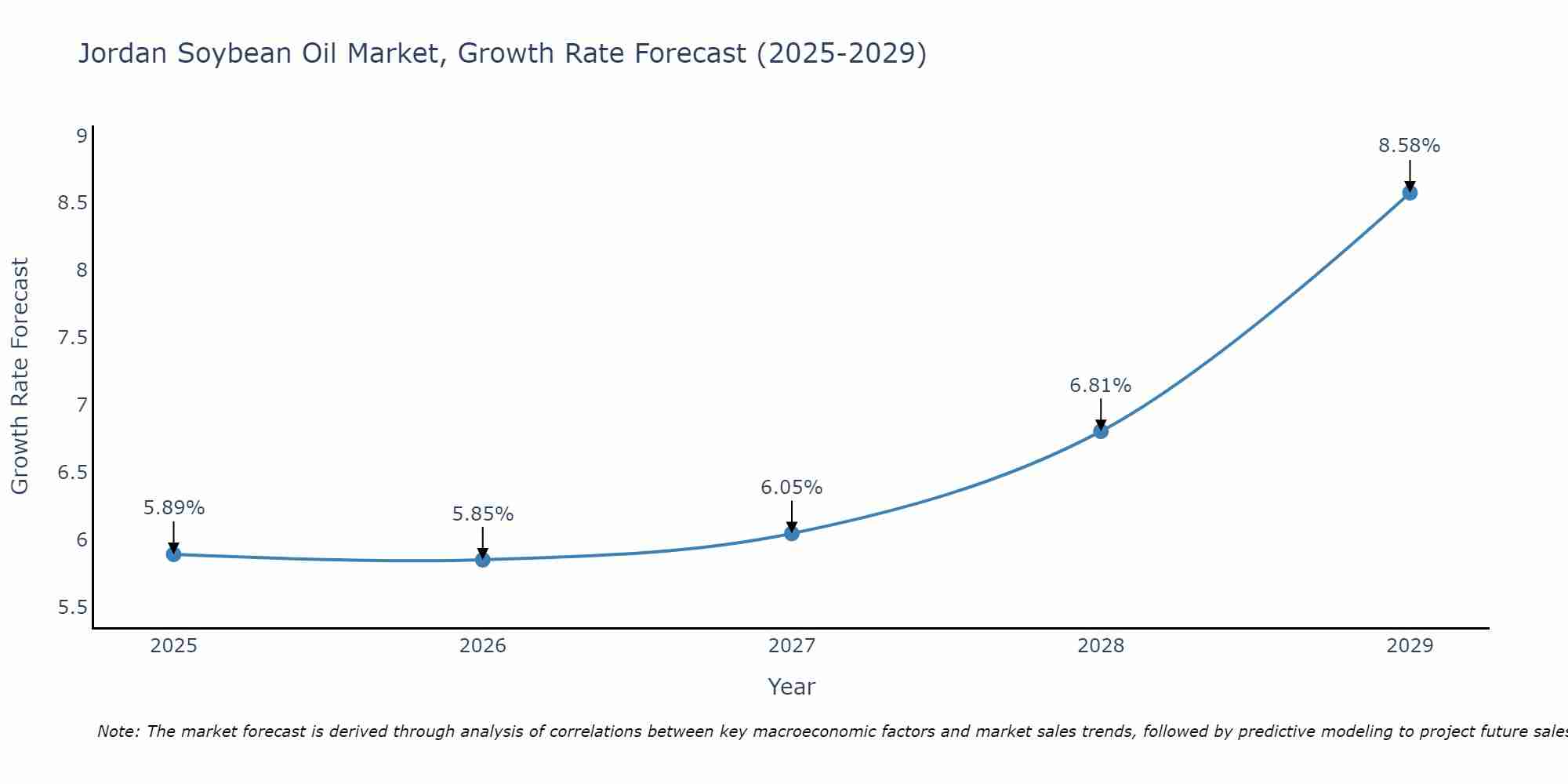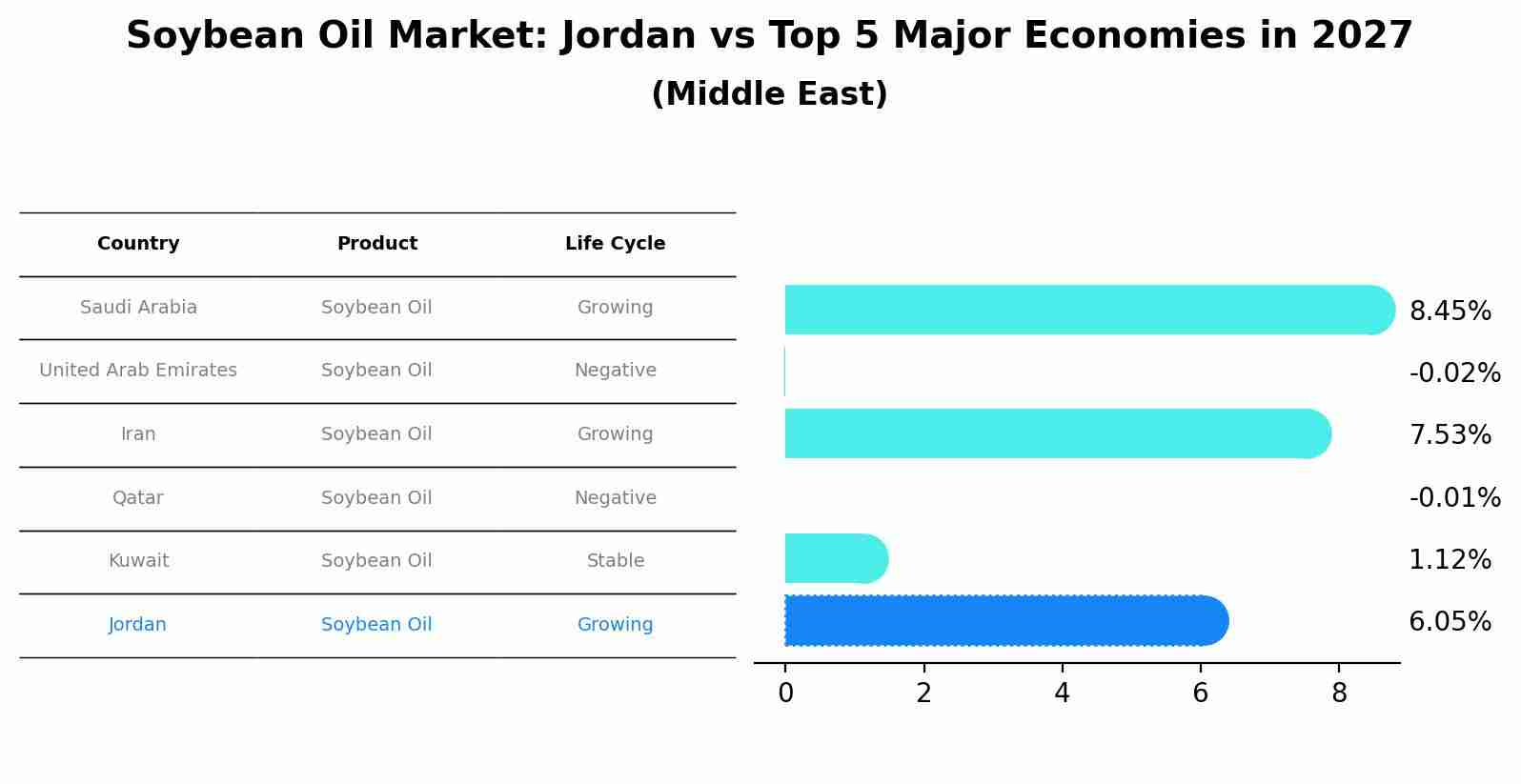Jordan Soybean Oil Market (2025-2031) Outlook | Share, Growth, Value, Revenue, Size, Companies, Trends, Industry, Analysis & Forecast
| Product Code: ETC385066 | Publication Date: Aug 2022 | Updated Date: Jul 2025 | Product Type: Market Research Report | |
| Publisher: 6Wresearch | Author: Ravi Bhandari | No. of Pages: 75 | No. of Figures: 35 | No. of Tables: 20 |
Jordan Soybean Oil Market Size Growth Rate
The Jordan Soybean Oil Market is projected to witness mixed growth rate patterns during 2025 to 2029. Commencing at 5.89% in 2025, growth builds up to 8.58% by 2029.

Soybean Oil Market: Jordan vs Top 5 Major Economies in 2027 (Middle East)
The Soybean Oil market in Jordan is projected to grow at a growing growth rate of 6.05% by 2027, highlighting the country's increasing focus on advanced technologies within the Middle East region, where Saudi Arabia holds the dominant position, followed closely by United Arab Emirates, Iran, Qatar and Kuwait, shaping overall regional demand.

Jordan Soybean Oil Market Synopsis
The Jordan soybean oil market is witnessing steady growth driven by increasing consumer awareness about the health benefits of soybean oil compared to other cooking oils. With a focus on healthier lifestyles and dietary choices, consumers are opting for soybean oil due to its high levels of unsaturated fats, omega-3 fatty acids, and vitamin E. The market is also benefiting from the growing food industry and the popularity of soybean oil in various culinary applications. Additionally, the presence of key players in the market, along with strategic marketing initiatives and product innovations, is further driving market growth. However, challenges such as fluctuating soybean prices and competition from other vegetable oils continue to impact the market dynamics, requiring companies to innovate and adapt to changing consumer preferences.
Jordan Soybean Oil Market Trends
The Jordan soybean oil market is witnessing several key trends currently. One prominent trend is the increasing consumer awareness and demand for healthier cooking oils, leading to a growing preference for soybean oil due to its perceived health benefits. Another trend is the rise of the food industry in Jordan, driving up the demand for soybean oil as a key ingredient in various food products. Additionally, the market is experiencing a shift towards sustainable and environmentally friendly practices, with consumers opting for soybean oil produced through sustainable sourcing methods. Furthermore, the market is seeing a surge in product innovation, with manufacturers introducing new variants of soybean oil tailored to meet the evolving consumer preferences and culinary trends in Jordan. Overall, these trends indicate a positive outlook for the Jordan soybean oil market in the coming years.
Jordan Soybean Oil Market Challenges
In the Jordan Soybean Oil Market, challenges include competition from other cooking oils such as olive and sunflower oil which are more commonly used in the region, limited awareness and understanding of the health benefits of soybean oil among consumers, fluctuating prices of soybeans in the global market affecting the cost of production, and the need for improved marketing strategies to promote the use of soybean oil in cooking and food preparation. Additionally, logistical challenges in terms of distribution and storage facilities may also impact the availability and accessibility of soybean oil in the market. Overcoming these challenges will require targeted marketing campaigns, educational initiatives to raise awareness about the benefits of soybean oil, and strategic partnerships to enhance distribution networks in Jordan.
Jordan Soybean Oil Market Investment Opportunities
The Jordan Soybean Oil Market presents investment opportunities in various segments such as production, distribution, and branding. With the growing consumer awareness of the health benefits of soybean oil, investing in soybean oil production facilities or partnering with existing producers for expansion can be lucrative. Additionally, establishing distribution channels to reach a wider market or investing in marketing and branding strategies to differentiate products can also be profitable ventures. As the demand for healthier cooking oils continues to rise in Jordan and the wider Middle East region, investing in the soybean oil market can offer long-term growth potential and attractive returns for investors willing to capitalize on the market trends and consumer preferences.
Jordan Agar Market Government Policies
The government of Jordan has implemented various policies to support the soybean oil market within the country. These policies primarily focus on promoting domestic production of soybeans to reduce reliance on imports and enhance food security. The government provides subsidies and incentives to farmers to increase soybean cultivation, as well as invests in research and development to improve crop yields and quality. Additionally, trade policies aim to facilitate the importation of soybeans for processing within Jordan, supporting local industries and reducing dependency on foreign suppliers. Overall, the government`s policies in the Jordan soybean oil market are geared towards building a sustainable and self-sufficient industry that can meet the country`s demand for edible oils.
Jordan Soybean Oil Market Future Outlook
The future outlook for the Jordan Soybean Oil Market appears promising with steady growth anticipated in the coming years. Factors such as increasing consumer awareness about the health benefits of soybean oil, rising demand for plant-based cooking oils, and the expanding food industry in Jordan are expected to drive market growth. Additionally, the growing focus on healthy eating habits and the preference for natural and organic products are likely to further boost the demand for soybean oil in the country. With advancements in production techniques and distribution networks, as well as potential opportunities for market expansion and product innovation, the Jordan Soybean Oil Market is poised for a positive trajectory in the foreseeable future.
Key Highlights of the Report:
- Jordan Soybean Oil Market Outlook
- Market Size of Jordan Soybean Oil Market, 2024
- Forecast of Jordan Soybean Oil Market, 2031
- Historical Data and Forecast of Jordan Soybean Oil Revenues & Volume for the Period 2021 - 2031
- Jordan Soybean Oil Market Trend Evolution
- Jordan Soybean Oil Market Drivers and Challenges
- Jordan Soybean Oil Price Trends
- Jordan Soybean Oil Porter's Five Forces
- Jordan Soybean Oil Industry Life Cycle
- Historical Data and Forecast of Jordan Soybean Oil Market Revenues & Volume By End-Use for the Period 2021 - 2031
- Historical Data and Forecast of Jordan Soybean Oil Market Revenues & Volume By Food for the Period 2021 - 2031
- Historical Data and Forecast of Jordan Soybean Oil Market Revenues & Volume By Feed for the Period 2021 - 2031
- Historical Data and Forecast of Jordan Soybean Oil Market Revenues & Volume By Industrial for the Period 2021 - 2031
- Jordan Soybean Oil Import Export Trade Statistics
- Market Opportunity Assessment By End-Use
- Jordan Soybean Oil Top Companies Market Share
- Jordan Soybean Oil Competitive Benchmarking By Technical and Operational Parameters
- Jordan Soybean Oil Company Profiles
- Jordan Soybean Oil Key Strategic Recommendations
Frequently Asked Questions About the Market Study (FAQs):
- Single User License$ 1,995
- Department License$ 2,400
- Site License$ 3,120
- Global License$ 3,795
Search
Thought Leadership and Analyst Meet
Our Clients
Related Reports
- South Africa Stationery Market (2025-2031) | Share, Size, Industry, Value, Growth, Revenue, Analysis, Trends, Segmentation & Outlook
- Afghanistan Rocking Chairs And Adirondack Chairs Market (2026-2032) | Size & Revenue, Competitive Landscape, Share, Segmentation, Industry, Value, Outlook, Analysis, Trends, Growth, Forecast, Companies
- Afghanistan Apparel Market (2026-2032) | Growth, Outlook, Industry, Segmentation, Forecast, Size, Companies, Trends, Value, Share, Analysis & Revenue
- Canada Oil and Gas Market (2026-2032) | Share, Segmentation, Value, Industry, Trends, Forecast, Analysis, Size & Revenue, Growth, Competitive Landscape, Outlook, Companies
- Germany Breakfast Food Market (2026-2032) | Industry, Share, Growth, Size, Companies, Value, Analysis, Revenue, Trends, Forecast & Outlook
- Australia Briquette Market (2025-2031) | Growth, Size, Revenue, Forecast, Analysis, Trends, Value, Share, Industry & Companies
- Vietnam System Integrator Market (2025-2031) | Size, Companies, Analysis, Industry, Value, Forecast, Growth, Trends, Revenue & Share
- ASEAN and Thailand Brain Health Supplements Market (2025-2031) | Strategy, Consumer Insights, Analysis, Investment Trends, Opportunities, Growth, Size, Share, Industry, Revenue, Segments, Value, Segmentation, Supply, Forecast, Restraints, Outlook, Competition, Drivers, Trends, Demand, Pricing Analysis, Competitive, Strategic Insights, Companies, Challenges
- ASEAN Bearings Market (2025-2031) | Strategy, Consumer Insights, Analysis, Investment Trends, Opportunities, Growth, Size, Share, Industry, Revenue, Segments, Value, Segmentation, Supply, Forecast, Restraints, Outlook, Competition, Drivers, Trends, Demand, Pricing Analysis, Competitive, Strategic Insights, Companies, Challenges
- Europe Flooring Market (2025-2031) | Outlook, Share, Industry, Trends, Forecast, Companies, Revenue, Size, Analysis, Growth & Value
Industry Events and Analyst Meet
Whitepaper
- Middle East & Africa Commercial Security Market Click here to view more.
- Middle East & Africa Fire Safety Systems & Equipment Market Click here to view more.
- GCC Drone Market Click here to view more.
- Middle East Lighting Fixture Market Click here to view more.
- GCC Physical & Perimeter Security Market Click here to view more.
6WResearch In News
- Doha a strategic location for EV manufacturing hub: IPA Qatar
- Demand for luxury TVs surging in the GCC, says Samsung
- Empowering Growth: The Thriving Journey of Bangladesh’s Cable Industry
- Demand for luxury TVs surging in the GCC, says Samsung
- Video call with a traditional healer? Once unthinkable, it’s now common in South Africa
- Intelligent Buildings To Smooth GCC’s Path To Net Zero


















